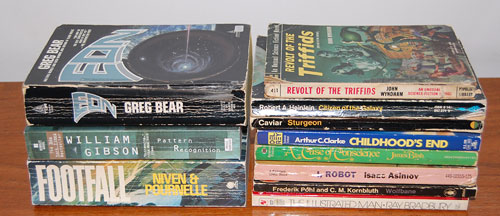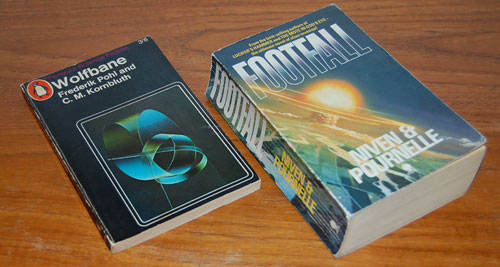I was putting in order our bookcase of Science Fiction, and noticed an interesting fact best illustrated by the two piles of books in the photo.
One pile has three books, all written after 1980. The other has eight books written in the fifties, the later part of the “Golden Age” of Science Fiction. And the two piles are the same height.

Fact is, most paperbacks published recently tend to be much longer than the “Pocket books” of the fifties. They can easily exceed 400 pages, where their predecessors ran happily to 200 or so. And the sad thing is, this does not make them better. The three fat books in the pile at left are certainly good – but the other pile contains absolute classics like Bradbury’s The illustrated man, Clarke’s Childhood’s end, and Asimov’s I, Robot (the wonderful short story collection, not the silly movie); the others, by such masters as Sturgeon, Heinlein, Blish and Wyndham were likewise influential and a joy to read.

Here, go read Footfall (1985), all 700 pages of it, and Wolfbane (1959), with a mere 160; both are wildly imaginative works, good SciFi indeed, but the GPP (goodness density per page) is on the skinny tome’s side. In fact, it makes me wonder, why did authors become so much more verbose of late? Any ideas?

May 16, 2008 — 6:37 pm
the price of paperbacks have gone up so drastically that people equate size to cost, akin to a lot of goods or foods in the US. thin books don’t sell as well because people don’t feel that they get their money’s worth.
May 16, 2008 — 8:16 pm
I think that the obesity epidemic affects all genres of paperbacks, not only Sci-Fi ones.
The drawback is that like obesity in girls, obesity in Sci-Fi turns me off. I feel more likely to dive into a Sci-Fi book if I think that I can finish it in few hours rather than in several days.
May 17, 2008 — 9:16 am
This is nothing compared to fantasy where the default unit of production is not the 150 page book but the trilogy of up to 3000 pages.
As Charlie says I think this is partly financial as the bigger the book, the more you can charge for it (therefore justifying raising prices) AND the bigger the book, the more people think they’re getting their money’s worth.
But I also think it’s a reflection of the fact that people don’t read as much as they used to, so rather than having loads of little books that allow a quick turn over of subject matter, people buy and are expected to buy huge hardbacks.
Which is unfortunate as I a) hate long books and b) hate hardbacks.
May 17, 2008 — 9:22 am
Charlie’s got it right. Sadly with inflation it’s really hard to justify buying a book that is under 200 pages for $7.00 when you can get a book four times as large for the same price. Quality doesn’t necessarily come into the fold because you can’t really judge quality from the size :P. Sometimes shorter books are really good, other times no so much.
May 17, 2008 — 3:02 pm
If the size = value = money motive is correct (as it may well be) this raises two questions in my mind:
1. Why do readers (who are, ipso facto, literate people) accept this obviously erroneous equation?
2. Why do authors abide by it? Do they get paid by the word? Do they get the length they write dictated to them by the publishing houses?
Sad… and I agree with Jonathan – I dislike fat or hardcover books, if for no other reason than that you can’t stuff them in a pocket, to read whenever you have a free moment…
May 19, 2008 — 9:56 pm
I think the reason that novels are longer after 1980 is that prior to 1980 novels were frequently serialized in magazines, which, I am guessing, kept the size of novels down so that they could be appear in three issues without radically increasing the page count of the magazine.
As to the notion of value, I’d like to point out that the cost of a movie ticket and a paperback book have been pretty much in sync at least since the 70s.
– Fritz.
May 21, 2008 — 9:16 pm
1: how would one know a book is good before it’s read? would you rather enjoy reading 500 (or more) pages, or 200 pages? if the probability of enjoyment is the same, a purchaser may rather be enjoyed for longer.
thinking of the harry potter series, can that same storyline be told in shorter books? i think it would have grown to a 25 book series if so.
2: sometimes. some writers are paid by the page/word. some are paid by the number of books sold. they abide by it because they like eating. it is HARD to get published unless one already has an established following in the industry. my wife is a writer, and we can wallpaper rooms with rejection letters.
May 30, 2008 — 12:25 am
I don’t know for sure, but my first guess when I read this post was that pre-1980, almost all writing was done on a typewriter, and somewhere post-1980, more and more writers had “word processors” and later computers with which to write.
I know what conclusion I draw from that, but I leave it up to you to decide what influence (if any) that has had.
May 30, 2008 — 7:40 am
Mike has an interesting point. I wondered many times how books were edited in the pre-wordprocessor days – forget typewriters even, how did Tolstoy manage to churn our War and Peace without white-out fluid? Did authors back then think more before they put their creation to paper? Did the novel form in their head in better quality when they wrote it out?
What is certain, I remember that coding software did involve lots more up-front diligence and proofreading back when you had to punch your code on cards or tape and wait 24 hours to get the output and find the bugs.
April 24, 2009 — 1:36 am
Interesting blog post. What would you say was the most important marketing factor?
October 15, 2012 — 3:00 am
As a rule of experience, shortening a text makes it almost always better. But that work step in the text production takes time and stands against some author’s vanity. So, pretext is soon at hand to skip the shortening.